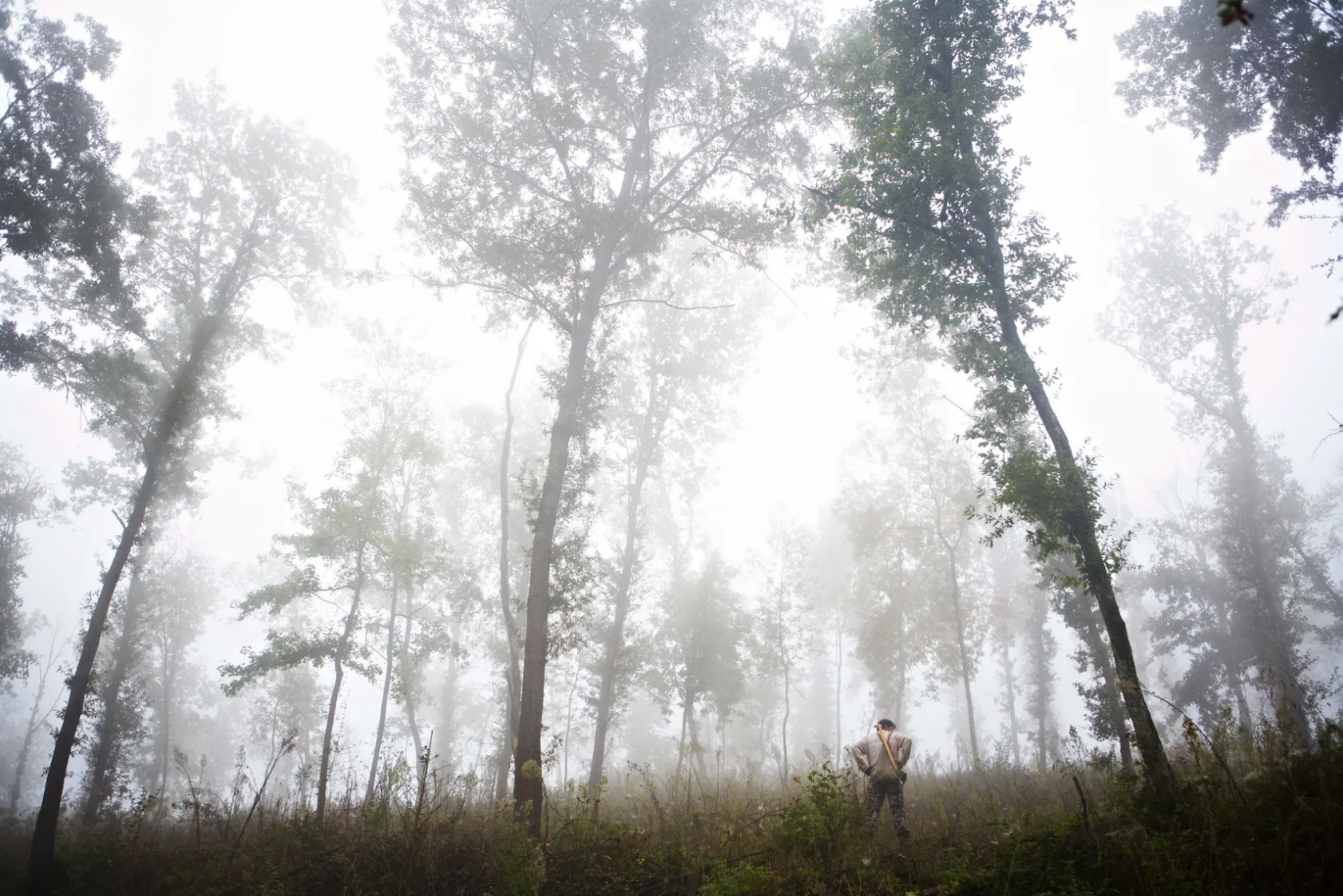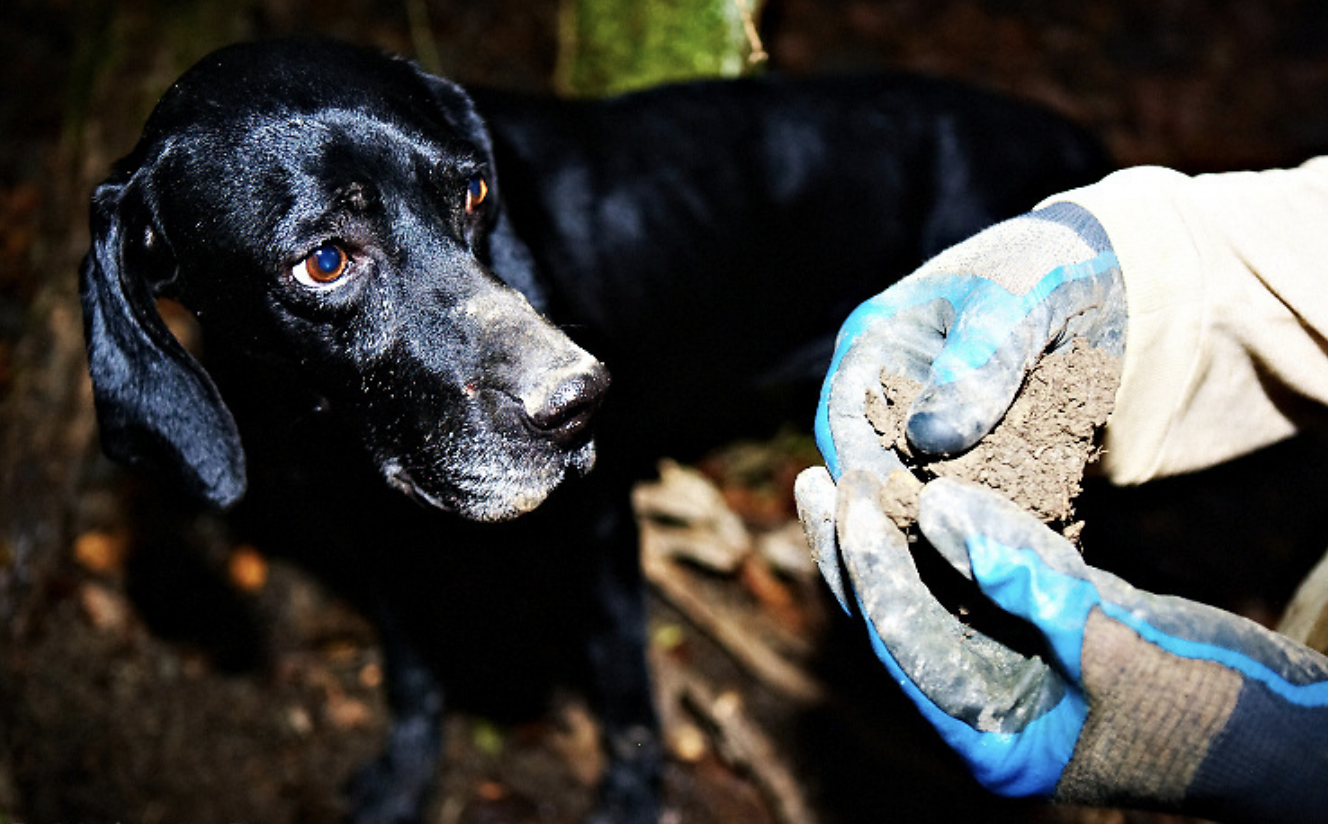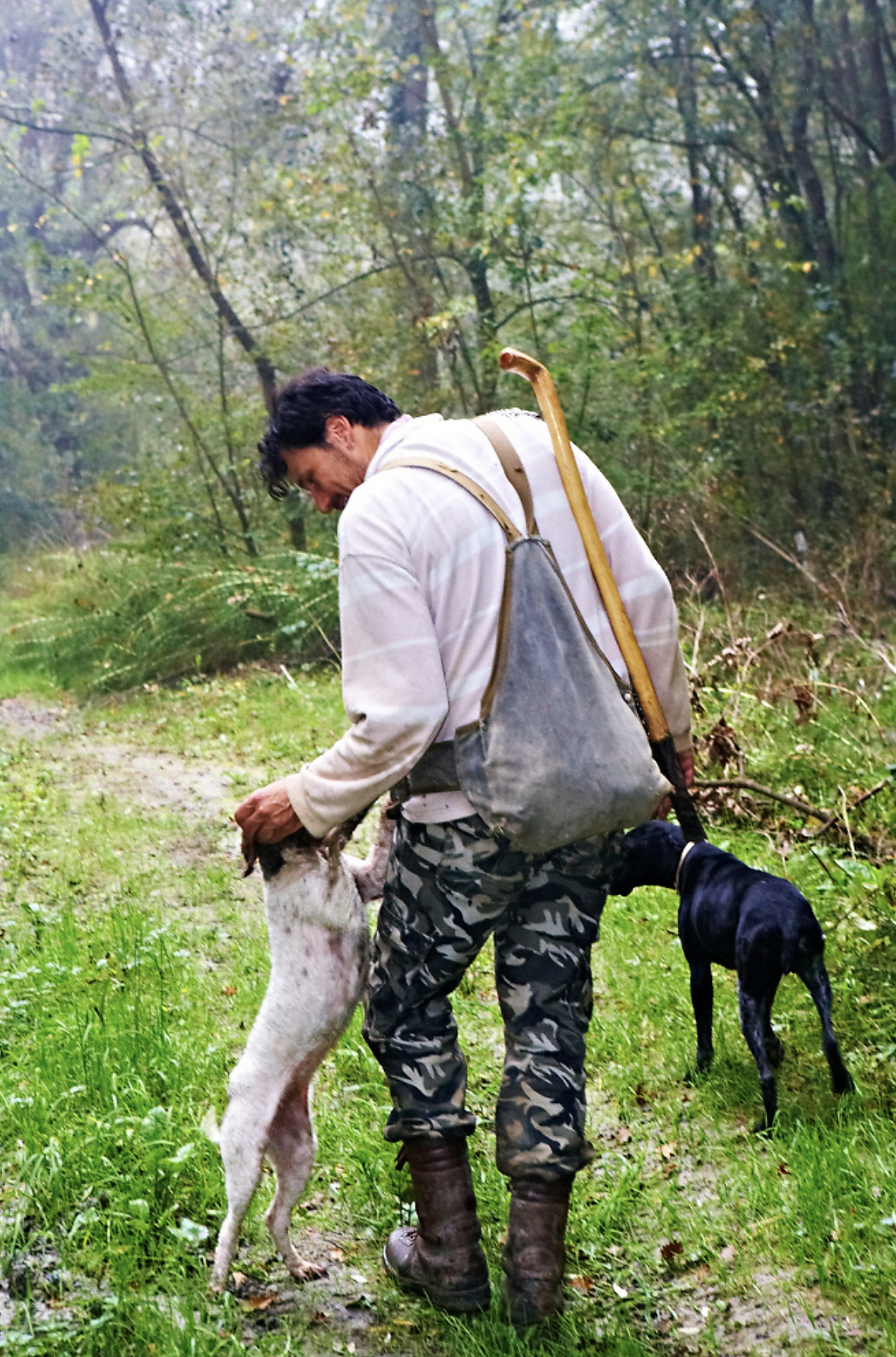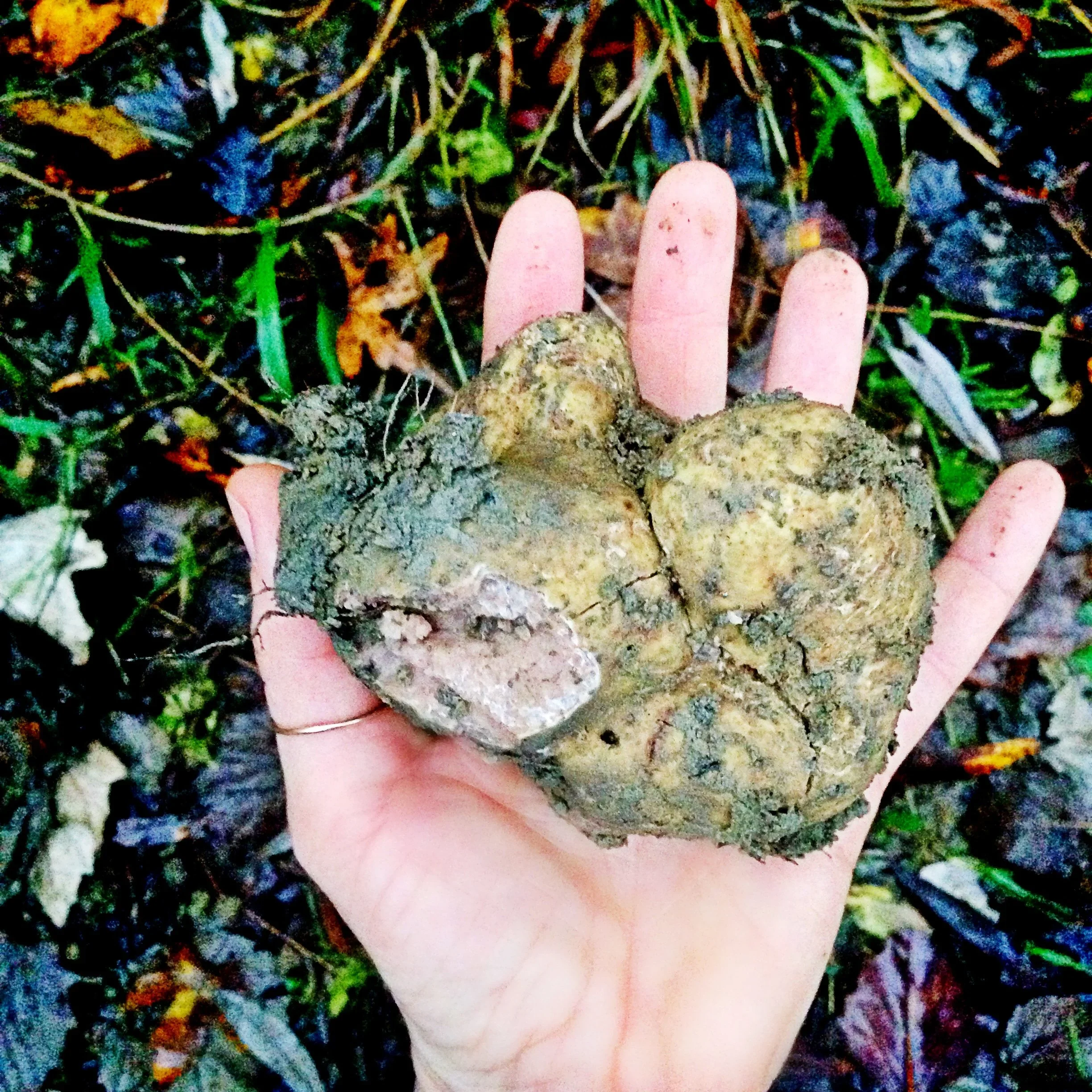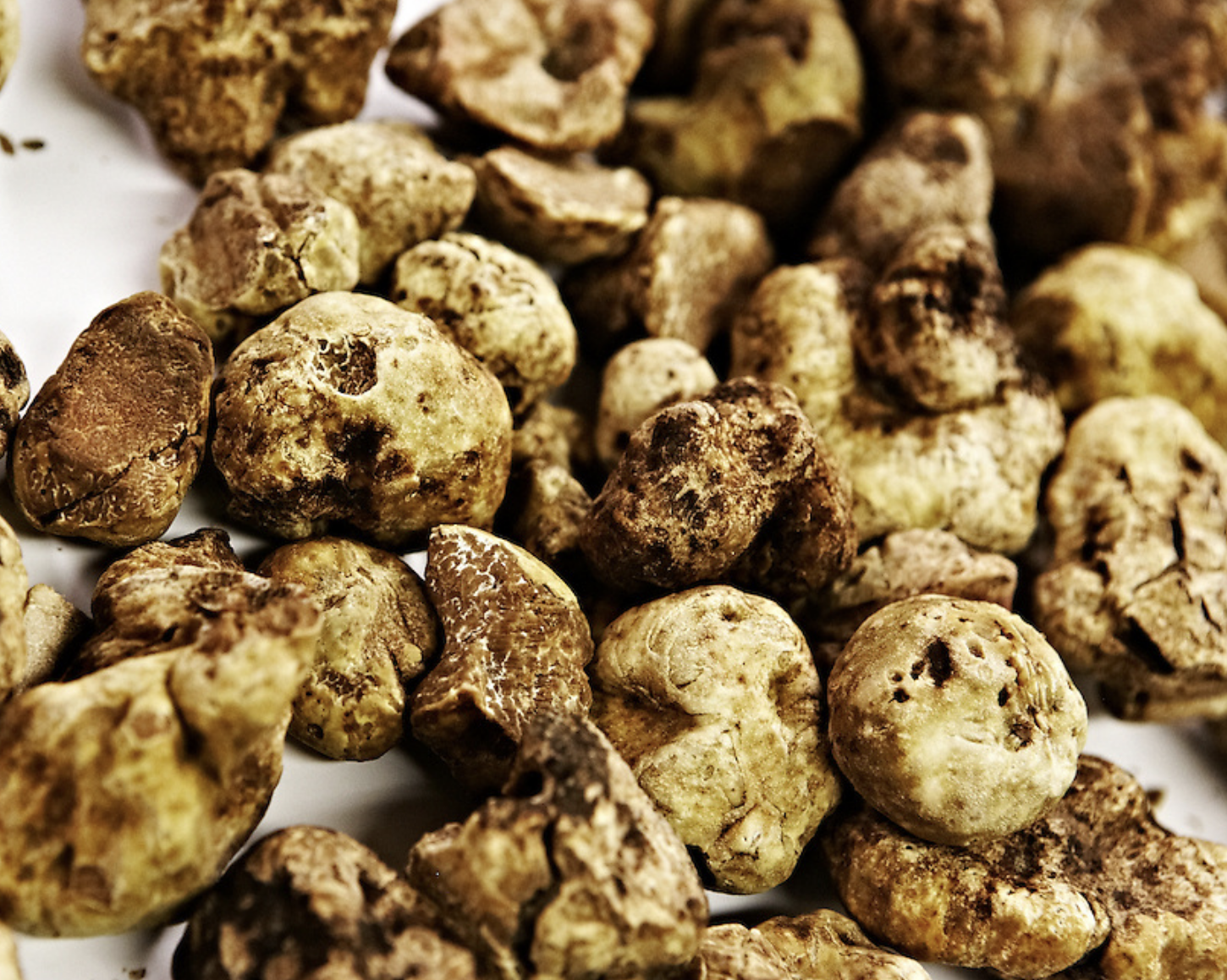Off the Map with Italy's Best Truffle Hunter
Turns out there's nothing all that luxurious about a real white truffle hunt.
Three hours before sunrise, I was standing on a pitch-dark street corner in a tiny village in central Italy, and I was freaking out. I'd been in Emilia-Romagna for a week, sampling cheese, drinking wine, and drooling over slices of exquisite salumi. Because it was October, always hovering on the edge of these experiences was the white truffle. Mysterious, intoxicatingly aromatic, expensive, impossible to farm and notoriously difficult to forage, truffles are one of the cornerstones of the region's gastronomy.
I was visiting Italy on a photo assignment, and my fixer had set up an afternoon foray to hunt some truffles. "The hunter will pick you up after lunch," he told me during a morning visit to a Lambrusco factory. "You'll go on a mini truffle hunt—the morning is when he does the serious stuff, and he won't bring anyone else with him then, even a serious hiker; you'll only hold him back." A mini truffle hunt? That was never going to work. I was serious about the real thing, and maybe he could tell. There was a flurry of phone calls as my fixer and the tourism officers huddled with their cell phones in a corner of the factory. Whatever they said worked—this famously solitary truffle hunter was willing to let me tag along. "He'll pick you up at five in the morning," my fixer said. "But you can't slow him down."
If you've ever been to Italy and think you've been on a truffle hunt—well, odds are good you actually haven't. No one goes on real truffle hunts. Most of the trips tourists are sent on are these mini hunts: afternoon affairs, leisurely strolls through a picturesque landscape, turning up a couple of the small, aromatic, intensely pricey fungi. The man (it's almost always a man) leading your hunt might be the real deal, but your trip into the woods isn't his main gig. Truffle hunters go alone, and they work hard and fast. The season for white truffles is only three months long, hunting them is arduous, and the financial stakes are high, so a real truffle hunter needs to be unencumbered. A gaggle of tourists snapping photos and asking questions and disrupting the dogs is only going to get in the way. Real truffle hunting isn't glamorous. It happens in dirt, darkness, and secrecy.
And so I found myself on that street corner, alone, in the dark, waiting to be picked up by a man I'd never met before. My panic was mounting—I'm not the outdoorsy type, definitely not the kind of person who can do a hardcore, eight-hour truffle-hunting hike through unmarked territory—when a dust-covered, typical two-door Italian banger pulled up out of the night and a man rolled down the window. "Melanie?" he asked. He then pointed at himself: "I, Gianluca." This was my ride. The smell of truffles was strong and powerful, and I shook his hand with the firmness of someone applying for a job with the President. To cover my nervousness and fill the silence, I started babbling, reeling through all of the gastronomic words in Italian I knew: prosciutto, pizza, gelato.
After thirty minutes of driving in darkness, we came to our destination. It was still night, and a thick blanket of fog covered everything. I hopped out of the car full of vigor and fear, and Gianluca popped open the trunk of the car to let his two dogs spring out. I casually checked out the truffle hunter. He was tall, well over six feet, and dressed for a military incursion: camouflage pants, waterproof boots, a lightweight pack. Meanwhile I was in skinny jeans and flat-soled fashion boots, carrying two cameras plus a tote bag with extra lenses and batteries. I was, I began to realize, totally inappropriately equipped for the ordeal that was about to ensue.
Gianluca handed me a flashlight, turned around, and disappeared into the darkness. I jogged to catch up with him, cameras swinging against my back, and then it began: the descent, a double black diamond of a slope, steeply plummeting down into a forested ravine. Gianluca meandered down as casually as if he was strolling along a beach, but I slid and slipped on the slick ground, turning my feet and body to be perpendicular to the incline, digging the edges of my fucking Tory Burch boots into the muddy mountain. I was a little worried about twisting my ankle, but I was a lot worried because even then, just five minutes into our hunt, I was already slowing Gianluca down. My eyes darted between the terrain beneath me and his muddy boots just ahead; to avoid falling, I had to take exactly the same steps he took. This is what it's like to be in the shit, I thought to myself in the darkness. I started out my photography career planning to be a photojournalist; I wouldn't have lasted five minutes in a real war.
I moved to Paris after school planning to be Henri Cartier-Bresson. I had my trunk, my pillow, and my camera, and I was going to go to document the world. What I wanted to do was tell stories, to get out there and shoot real things. For one reason or another, that didn't happen, and I came back to New York where I became primarily a portrait photographer. Still, I love the underdog stories, the meaningful journeys. The grit, the reality. You look at a white truffle, presented to you at a restaurant like it's a precious gem, and you twirl your hair and say to your dining partner, "Oh, I don't know, it's $75 for the truffles, should we?" and you do or you don't get them shaved in a flurry over your pasta or eggs. But there's grit there, behind that satin-lined box. There's this brutal work: This guy is up every morning hours before the sun, tramping in silence and darkness, digging in the mud with his dogs and his hands, turning up these knobby little jewels, breathing in this rich blessing of nature.
Twenty minutes later we were down the side of the mountain and on blessedly flat ground. Gianluca issued a gentle call to the dogs: "Piano, Guenda," he said to the brown one, a Lagotto Romagnolo. To the black one, a pointer mix, strong and aloof, like a queen: "Piano, Nera." He wanted the dogs to move slowly. The forest was quiet and still, the only sound the cracking of the branches under our feet. The truffle hunter seemed so very calm, so connected to the earth. I watched how he walked without even looking down, and tried to imitate him, to keep my gaze up. I took a picture or two. It was peaceful. And then boom—he was off, darting like wildfire after the dogs, who were running like rockets, shouting at them to slow down, slow down!
I ran after them, finding Gianluca crouched on the ground next to a spot where the dogs were furiously digging. He distracted them with a treat from his pocket, and reached out to dig at the earth himself. Slowly it began to surface: a truffle. It was buried deep in the mud, but even before it emerged fully, I could smell it, musky and dense. On the end of Gianluca's walking stick was a blade that he used to gently ease the truffle out of the ground. The truffles are often attached to the roots of trees, and if he finds one that's too deep, or too firmly connected, he'll leave it—better not to disrupt nature, he explained. But this one wanted to come out. Slowly, slowly, Gianluca extracted it from the dark earth. In the intensity of the moment, I felt like crying. But there was no time for that: the truffle was out, Gianluca popped it into a plastic bag, and it was gone. We headed off in search of the next one.
Our progress was silent and steady, with occasional interruptions for Gianluca call to the dogs, or to stop and listen for them. The dawn broke slowly, and I noticed the foliage, raw, rough, and beautiful. We didn't stay on the flat ground, we went up and down, over and under. Most truffles, it seemed, prefer to grow in small, difficult places to find. Gianluca explained that while this stretch of land—his preferred hunting ground, whose precise location he keeps closely guarded—is rich in truffles, where they grow within the area is very unpredictable; they rarely grow in the same spot twice. He used no map or compass, following the dogs and his own instincts, meticulously covering seven kilometers on our eight-hour trek.
I tried to relax into the rhythms of the hike, to let my body feel the earth underfoot and embrace nature, and immediately I was down in a pile of mud, my 200mm camera lens stabbing me right in the back. But I was far more worried about myself and keeping up than I was about my equipment—I noticed that one camera had stopped working, and seriously considered just dumping it to shed some weight. My thoughts were interrupted by the dogs finding another truffle, but despite Gianluca's sprinting he was too slow to reach them, and the dogs devoured it. Once a dog has sniffed a truffle, she'll dig furiously until she either breaks it or eats it. Hence the hurry.
The sun was fully up when Gianluca turned to me and asked a strange question: "Aurora borealis?" I repeated it back to him: "Aurora borealis?" He said it again, and I replied, "Northern lights?"
"Yes, speak, tell me," he said, and I haltingly explained that the northern lights are beautiful, but I had never seen them. He seemed puzzled. Twenty minutes and four truffles later he turns to me and asks, "Ironman?" Now I was the puzzled one. I slapped my bottom and said, "Clearly, I have never done an Ironman." Gianluca just looked at me, confused.
Using our broken English and Italian—not to mention a lot of pantomime—I discovered that my fixer hadn't been kidding when he said that Gianluca never, ever takes anyone truffle hunting. I learned that I was the first person he'd brought with him in twenty years of this work, and that the only reason he'd agreed to take me at all was that he'd been told the bald-faced lie that I was an arctic explorer who split my time between the North Pole and New York City, doing Ironman triathlons on the side. Moved by my desire for a real truffle hunt, and maybe up for a little mischief, my fixer had called Alberto Bettini, proprietor of the trattoria Amerigo dal 1934 in the tiny municipality of Savigno, who buys truffles from Gianluca. Alberto knew Gianluca was dying to see the northern lights, and wasn't above a little light fibbing about my nonexistent background as a hardy explorer to get him to agree to bring me along.
While we unraveled the story, we walked, and the terrain was getting rougher. Soon we came to a little stream. "Jump," Gianluca said to me. "Like Van Halen song! Jump!" Maybe he could see in my eyes that there was no way I could leap across. Maybe it was a moment of chivalry, or pity. But in a single effortless movement, he picked me up and carried me across to the other side.
The dogs were climbing higher and higher, to more and more difficult-to-reach spots, with Gianluca springing along behind them. He and the dogs dashed off after another treasure and instead of following, I sat down on a mossy trunk sit to empty my boots of dirt and stones and take stock. I had no idea where I was, my phone had no service. If Gianluca didn't come back, I would never be able to find my way out of here. And, despite the terror I'd felt earlier in the morning, I was okay with it. I wasn't scared anymore. I breathed the thick, earthy air and felt restored and happy. This was the magic, this was why Gianluca was the most celebrated, most successful truffle hunter in the area. He gets out there first, and he goes in deep. I thought about the truffles themselves, how much work they require of Gianluca, and how brief but powerful the pleasure is that they give us in restaurants—later that day, when we would feast on the truffles at Alberto's restaurant, I wouldn't leave one scrap on the plate. I thought about the air, the quiet, the mud, the trees, the mist, the sun. I felt connected to it, I felt awake.
Guenda and Nera come bounding back through the trees, knocking me off the trunk with their energy and affection. I got up, refused Gianluca's offer to help carry my cameras, and we set out into the woods again, to find even more treasure.

